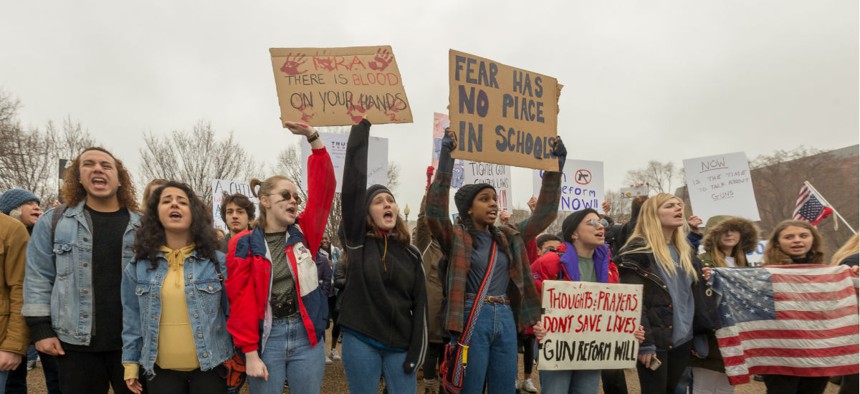
High school students from across the Washington area protest gun control laws and gun reform in front of the White House on Feb. 19. Joseph Gruber/Shutterstock.com
Two Words People Should Hear More Often From the Government: I'm Sorry
Here are five reasons why governments should say that more often.
British hip-hop artist Stormzy stirred up a cyclone at the Brits, the UK’s version of the American Grammy’s, last week.
He called out Prime Minister Theresa May for the government’s slow response to the tragic Grenfell Tower high-rise fire, an inferno that took 71 lives back in June 2017. But after winning the awards for album of the year and best male solo artist, Stormzy attacked the prime minister in rap.
“Yo Theresa May, where’s that money for Grenfell? What, you thought we just forgot about Grenfell? You’re criminals, and you’ve got the cheek to call us savages?” The response of the PM’s spokesman fell flat: “If there are concerns being raised we would look at those.”
That didn’t satisfy either Stormzy—or many watching the Brits. People want more. Maybe even “I’m sorry.” And here are five reasons why governments should say that more often:
1. The public is mad as hell. If there’s any lesson that comes out of the Brexit vote—and the election of Donald Trump and the October Czech presidential election and the rise of populism in Austria, Hungary, and Poland—it’s this: the public is mad as hell. They don’t want to take it anymore. If governments don’t want their people to get madder, they need to connect with their people. Saying “I’m sorry” a bit more often would help.
2. The public doesn’t think anyone is listening. Too often people hear spin or see tweet storms instead of a government that reaches out to them. A simple “I’m sorry” might say, “We’re listening.” Especially when the government’s first steps clearly aren’t “good enough”, as May admitted in the days after Grenfell.
3. Many citizens think too many government officials are in business for themselves. Trump’s “drain the swamp” pledge resonated because too much of government seems to voters like a closed corporation, impenetrable from the outside and run for the benefit of those on the inside. Saying “I’m sorry” might prove a much better way for government leaders to connect with citizens than Bill Clinton’s now-hackneyed, "I feel your pain.”
4. Government officials are looking for someone to lead. The chief administrative officer at the U.S. Housing and Urban Development Department found herself demoted. Her offense: refusing to pay too much money for a new chair in the secretary’s office, during an expensive redecorating project. The official, Helen Foster, said she faced retribution for discovering a $10 million shortfall in the department’s budget, and a ruined reputation. She wants her job back and an apology. Inside the government, career leaders are looking for signals about whether they dare to lead. Sometimes, “I’m sorry” can tell them what behavior is valued most. Or at least tolerated, in the interest of following the law.
5. No one ever seems to be in charge of anything. In an increasingly complex and interdependent world, it’s truly the case that leaders can’t really run anything, at least on their own. At Grenfell, investigators found that the fire started accidentally in a defective Hotpoint fridge. It spread up the side of the building, though aluminum cladding and insulation chosen because it was cheaper. Firefighters struggled with low water pressure and with radio problems that made it hard to communicate. The tragedy wasn’t just one failure but a series of problems that rippled throughout the entire system.The people want accountability, someone to reach out to and yell at. But no single person can fix problems, big or small. Ironically, many would say that the local football club, Queens Park Rangers, has done more for the local community in the aftermath of the fire than government itself. Deep down, the public knows the world is complex, but they want someone who gets it and who’s willing to step in to accept responsibility for making sure that big problems don’t happen again. Saying “I’m sorry” can, simply and directly, say, “that’s awful—and I’ll make sure it gets fixed.”
Big governments aren’t good at apologizing. One analyst found just five times that the US has apologized for its official actions (shielding a Nazi war criminal, interning Japanese civilians during World War II, overthrowing the Queen of Hawaii, experimenting on black men to learn the long-term effects of syphilis, and for slavery.) None were easy, and none obliterated the mistakes that had been made. But saying “I’m sorry” made it easier to tell those hurt by the mistakes that the government understood the hurt and to make sure it wasn’t repeated.
Lawyers often raise objections to apologies for fear it would open the doors to lawsuits. Politicians never want to admit mistakes because they worry it would make it easier for their challengers. But saying “I’m sorry” doesn’t necessarily mean “it’s my fault” and in the days of social media and 24-hour news, it’s not as if not saying it somehow provides a shield from legal or political attacks. Governments would be a lot better off if they said it a bit more often.
A version of this column was first published by the Centre for Public Impact, a nonprofit foundation that aims to improve the impacts of governments.
Image via Joseph Gruber/Shutterstock.com.







